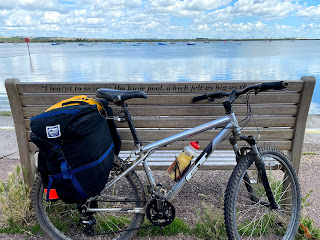I'll cut a long story short (that's what Dad always says, though he's never knowingly told any story the short way). Yesterday, we finally admitted we couldn't cope at home as a family any more. Dad has moved to a care home.
I don't think anyone's happy. Relieved, because Dad is safe. And he's with people who are kind and look after him - he's been in this home before while Mum rested, so we're reassured he's with good people.
But Dad's suddenly not at home. In a home is not the same as at home. He's baffled, and so, I think, are all of us. The shape of our family has changed, geographically - Dad is semi-detached. We have to ask permission to visit (these are Covid times). We can't make his favourite meal if he's sad. We can't take a mug of tea out to the bench in the garden and watch the wind in the trees.
Today, I settled down to make Dad a photo album that he can share with his new carers, and that we can look at together. It has photos of all of us over the years and I hope it will help him know we're here, he's at the centre of our family, and we love him.
But the earliest photo I have is the one at the top of this piece - of me and my Dad, six weeks after I was born. And isn't that shocking? Dad was 32 then. He'd been a little boy, had his appendix ripped out (his brutal scar still shocks medics), lived in London through the war, made explosives in the family greenhouse and killed the neighbours' chickens, ridden a motorbike, worked in his Dad's building firm, climbed rocks and mountains, done his national service on Gibraltar in the tunnels, come home and trained as a civil engineer, worked in London's sewers, met Mum, gone to jazz clubs, married Mum ... And I have not one photo of any of this. It's as if I think Dad's life began the day I was born.
So, maybe it's displacement, a way for me to understand what has happened. But I'm going to sit down with Mum and start Dad's album where it should begin. We'll pull out all the oldest photos from their oldest albums, as if we're remembering for Dad what has slipped out of reach in his own mind. I know somewhere there's a photo of a very small Dad in a terrible home-knitted one-piece swim suit that sagged like an old sofa as soon as it got wet, and I'm looking forward to laughing about it with him very soon.

















